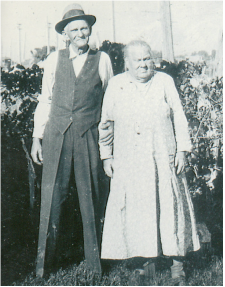 Jessie and Daisy
Jessie and Daisy My family is huge, but I’ve lost touch with most of them. They’re interesting, though. Go back far enough, I discovered, you come up against some pretty tough folks. One of my great-great grandmothers pulled a wooden handcart across the plains and desert to a corner of the west that became Utah. These Mormon ancestors of mine were strong because they had to be. When they settled down, even in this desolate place, they stuck. When I was a boy, this farming community in central Utah felt the end of the earth. The town, really a village, was settled in 1851. Nearly a dozen of my mother’s surviving aunts and uncles still lived in the area when my parents and I visited, most of them still farmers. A few of the siblings, including my grandmother, had escaped.
The clan began by chance as the nineteenth century was muddling its ungainly way toward the new century. When my great grandparents finally reached this part of what had been called the Promised Land, they had nothing but grit and determination to help them survive. Jessie and Daisy, my great grandparents, didn’t even know each other when Fate threw them together.
Picture this: a deeply rutted dirt trail, and here comes Jessie, a tall, raw-boned man, sunburned and skinny, with a baby but no woman, ready to settle down on land that he intended to farm. And here comes a family, husband and wife and several kids, all of them hungry and dirty and exhausted from weeks of travel. For them, this so-called Promised Land, the end of a trip that started months earlier in England, wasn’t living up to that promise.
Jessie eyed the travelers, they stared back at him. The kids and women hung back, while the two men talked. Jessie explained his situation: he had a bit of land, what could pass for a house, and was ready to start tilling the soil and raising animals, but his wife had gone and died on him, leaving the kid. He couldn’t take care of the thing and get a farm going at the same time. He needed a woman, a wife.
The other man understood exactly what Jessie needed. He looked back at his disheveled, weary family, and motioned for one of the girls to come forward.
“Here,” he said, “take Daisy.”
The girl was fifteen and strong, although not much to look at, but it was possible that she’d clean up okay. She’d grown up taking care of her brothers and sisters and knew all about caring for babies. Most important, it’d be one less mouth to feed, if Jessie took her off his hands.
A deal was struck and the two parties went their separate ways. Daisy and Jessie were married in the Latter Day Saint church and produced their own dozen children, most of whom survived. Those kids, in turn, married and created families, and so it went, generation after generation. A few of the offspring wandered away from the little community for various reasons -- the Great Depression, World War Two, restlessness, ambition – but most stayed within spitting distance, as folks there said, of where Jessie and Daisy were first thrust together by Fate.
I never knew Jessie and Daisy, although I’ve seen snapshots of them in old age. My mother always said that the old lady was grumpy and mean. Maybe so, but I don’t think Daisy had an easy time of it for the eighty or so years she endured life in the Promised Land.
My parents and I often stayed with my Uncle Sam, who looked a lot like Jessie, judging from blurry brown photos I’ve seen of the old man, and like his pa he produced a big family to help on the farm. Other times, we stayed with my Uncle Ren, who managed to build a big basement on which his farm house someday was supposed to stand, but he never could get together the cash to do that, so his family just lived in that basement, fixed up with rooms and electricity and plumbing.
These folks were pretty much like folks in rural communities all over America, I imagine. Many of them were farmers, but some, like another uncle of mine, took to repairing trucks and tractors and cars, while others found jobs in the little towns nearby. They may not be sophisticated, but they know what they know and don’t need to know anything else. And come the holidays they get together, cook up a feast, gather round, red-faced and, as happy as they’re able to be, celebrate whatever there is to celebrate.
 RSS Feed
RSS Feed